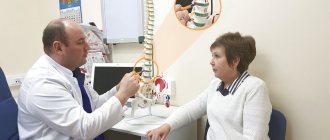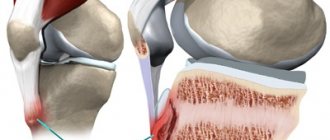Almost every person has experienced severe headaches, back pain, sleep disturbances, dizziness or other ailments that require the attention of a specialist. A person who comes to a medical institution with similar problems is referred to a neurologist or neuropathologist.
Neurologists at the Yusupov Hospital prescribe a special therapeutic complex for treatment, which takes into account the patient’s characteristics. The complex usually consists of drug therapy, physiotherapy, and rehabilitation measures. This can significantly improve the quality of life of a person with a neurological disease.
Who is a neurologist and neuropathologist?
A neurologist is a specialist who graduated from a medical university or institute, after which he completed an internship or primary specialization in neurology. A neurologist is engaged in the diagnosis and treatment of diseases and pathological conditions associated with disruption of the human nervous system. Specializes in diseases of the central and peripheral nervous system. These diseases include neuritis, neuralgia, strokes and micro-strokes, epilepsy, dementia, encephalitis, neoplasms in the brain and spinal cord. If mental disorders do not arise during the development of such diseases, a neurologist is involved in eliminating the disorders. Otherwise, a psychiatrist joins the treatment of the patient.
Neuropathologist is an outdated name for a neurologist. The concept was used in the USSR to designate a specialist who received a higher medical education and qualification in the specialty “Neurology”. The concept of “neurologist” was widely used until the 80s of the twentieth century. Now this term is practically not used. It can rarely be found in specialized literature. The modern nomenclature of medical specialties uses only the concept “neurologist” to designate such a specialist.
Required personal qualities
Only 1 out of 100 university graduates can become a good neurologist. This low percentage is due to the complexity of the specialty and the long list of required personal qualities.
List of important character traits:
- responsibility;
- determination;
- high level of intelligence;
- scrupulousness;
- communication skills;
- friendliness;
- thoughtfulness;
- desire for self-improvement.
The difference between a neurologist and a neuropathologist
Having defined the meaning of the concepts “neurologist” and “neuropathologist,” we can conclude that they are actually the same specialist. Only the term “neurologist” is already outdated and has practically gone out of use, while the term “neurologist” is actively used in modern medical practice.
It should be noted that both concepts are still used abroad, but they are somewhat different. A neurologist (neurologist) is engaged in the diagnosis and treatment of diseases of the nervous system, and a neuropathologist (neuropathologist) is a specialist who studies the pathomorphology of the nervous system. The field of activity of a neuropathologist relates to anatomical pathology, neurology and neurosurgery. The specialist studies diseases and diagnoses neurological pathologies through microscopic examination of the patient’s tissues.
Make an appointment
What can the doctor prescribe?
After diagnosis, the neurologist prescribes treatment. It can be conservative and operative.
Conservative treatment methods include:
1. Use of medications
2. Physiotherapy
3. Therapeutic gymnastics
Each of the nervous diseases has certain risk factors. They can be different habits, types of work, psychological conditions. The neurologist analyzes the patient’s lifestyle, identifies these factors and makes recommendations for eliminating them.
In other words, changes in the patient’s lifestyle play a very significant role in the treatment of nervous diseases.
Important! Nerve tissue recovers slowly. Therefore, good neurologists always try to preserve it, using the entire range of conservative treatment methods. And only in the most severe cases, the neurologist resorts to radical treatment - surgery.
The operations are performed by neurosurgeons.
What diseases does a neurologist treat?
Neurologists at the Yusupov Hospital are leading experts in the field of diseases of the central and peripheral nervous system. They treat patients with pathologies of the central and peripheral nervous system. The diseases manifest themselves as paralysis, loss of temperature, pain, tactile sensitivity, convulsions or mental health disorders. The competence of neurologists includes the following conditions:
- headache;
- epileptic seizures;
- disturbances of consciousness;
- back pain;
- head and spine injuries.
Neurologists at Yusupov Hospital treat the following diseases:
- Parkinson's disease is a demyelinating disease in which movements slow down, muscle tone increases, and tremors appear;
- Alzheimer's disease;
- transient cerebrovascular accidents, hemorrhagic and ischemic stroke;
- sciatica – neuritis of the sciatic nerve, manifested by acute pain in the lumbar and sacral region;
- meningitis - inflammation of the meningeal membrane of the spinal cord;
- myasthenia gravis is a genetic disease in the presence of which muscle weakness and pathological fatigue progress;
- myelitis – inflammation of the spinal cord of infectious origin;
- multiple sclerosis;
- muscular dystrophy – a degenerative disease caused by damage to skeletal muscle fibers;
- ALS is amyotrophic lateral sclerosis or motor neuron disease.
The help of a neurologist is also necessary for neuralgia, neuritis or polyneuropathy, neoplasms of the brain or spinal cord. Patients with the following syndrome need consultation and observation of a neurologist:
- restless legs;
- attention deficit hyperactivity disorder;
- chronic fatigue.
Tuberculous meningitis, tunnel syndrome, extrapyramidal disorders, encephalitis and encephalopathy are diseases that require the help of a neurologist. A neurologist-vegetologist studies the autonomic nervous system, its disorders, causes of diseases and prescribes treatment.
Main responsibilities
A neurologist has a rather narrow range of responsibilities. Therefore, a specialist has to do the same work every day.
Main responsibilities:
- outpatient or inpatient treatment of patients (multiple sclerosis, cerebral palsy, speech disorders, etc.);
- rehabilitation of patients who have suffered a stroke;
- conducting examinations and diagnostics;
- issuing referrals for examinations;
- carrying out medical examinations and medical examinations;
- participation in the commission for issuing permits to obtain a driver’s license or carry a weapon;
- issuing sick leave certificates and other similar documents.
Signs of neurological diseases
Diseases of the nervous system do not appear immediately, but develop slowly and gradually. They lead to dangerous, severe and irreversible consequences - paralysis, disability, loss of intelligence. As a person ages, this risk only increases.
With peripheral paralysis, muscle contractility is lost, a person cannot move independently, he does not control his own. Paresis is a partial loss of motor activity in the muscles. In both conditions, muscle atrophy develops, muscle volume decreases, tendon reflexes are absent, and muscle tone is lost.
Central paralysis is manifested by increased muscle tone and increased speed of tendon reflexes. When the basal ganglia, which are located in the white matter of the brain, are damaged, the regulation of motor and autonomic function occurs, which affects the motor skills of movements. They slow down, become involuntary, trembling (tremor) appears, and muscle tone changes. If the cerebellum is damaged, coordination of movements is impaired, speech becomes unclear and slow, and the limbs weaken.
Make an appointment
Career
While working, doctors are awarded qualification points. They serve as confirmation of accreditation and take into account the presence of:
- complex manipulations;
- participation in scientific and practical conferences, seminars;
- publication of articles, books, dissertation defense.
The accreditation commission, which sums up the points and makes a decision on the possibility of further work, meets every 5 years. If there are not enough points, the doctor is deprived of the right to continue working.
All the doctor’s achievements, his level of professionalism and experience are reflected in his qualification category. It is assigned by a special commission based on the results of his written research work. Obtaining a category is voluntary, but its absence hinders career growth.
When to contact a neurologist
One of the most common symptoms in which you should consult a neurologist is headache. It can be a consequence of overwork, constant stress, increased anxiety, atherosclerosis, micro-stroke, etc. Almost always, this condition is tolerated “on your feet” and is eliminated with painkillers. Such an approach can lead to negative consequences, since a headache is a signal from the body about the development of pathology. There are many diseases, a symptom of which is headache. Only a qualified neurologist will be able to determine the root cause of the ailment and select adequate treatment.
You should also make an appointment with a neurologist if you have the following symptoms:
- dizziness;
- weakness;
- periodic darkening or blurriness before the eyes;
- sleep disturbance (insomnia, nightmares, sleepwalking);
- muscle pain;
- impaired coordination of movements;
- unsteadiness of gait;
- speech disorder;
- visual impairment;
- loss of consciousness;
- single or repeated convulsive seizure;
- osteochondrosis;
- diseases of the cardiovascular system.
It will be useful to visit a neurologist for prevention for those who are exposed to factors that provoke neurological pathologies:
- frequent stress;
- work that requires increased attention;
- bad habits (smoking, alcohol abuse);
- old age (after 60 years the risk of developing dementia increases);
- hereditary predisposition to neurological diseases.
The patient should consult a neurologist if his motor reaction has slowed down, a feeling of stiffness in the body, trembling in the arms and legs, or convulsive muscle contractions has appeared. Pain in the back, shoulders, arms and legs, decreased sensitivity in some areas of the skin, numbness and tingling also require examination by a neurologist. If memory deteriorates, changes in sense of smell, or taste disturbances, a consultation with a good neurologist is necessary. This doctor will also help patients suffering from unreasonable attacks of fear, panic, rapid heartbeat, chills or a feeling of heat throughout the body.
When is a doctor needed, or what symptoms should you see?
- You sleep poorly at night, and during the day you feel constant, irresistible sleepiness
- Have difficulty withstanding physical activity and get tired quickly
- You have high or, conversely, low blood pressure
- You are haunted by headaches, no matter what nature. Particularly dangerous if they are accompanied by nausea or vomiting
- You faint or feel dizzy
- You tend to sweat excessively
- Memory deteriorates and attention decreases
- You have become overly irritable and hysterical
- You began to hear, see and feel worse
- There was noise in the ears
- Arms, legs and other parts of the body began to go numb
- You experience pain in your limbs, as well as in your neck, lower back, and chest.
- Your body is cramping
- The appearance of tics, paresis and paralysis
The same symptom can be the result of different ailments. The neurologist’s task is to identify the true cause. For example, a headache may occur due to overexertion or fatigue, or due to the development of some serious pathology. Therefore, any headache, especially systematic, requires serious examination.
Appointment with a neurologist
At the appointment, the neurologist asks what complaints the patient has, finds out when the first symptoms of the disease appeared, and whether they are progressing.
Then the neurologist finds out whether the patient’s closest relatives had similar signs. Conducts an external examination to determine whether there is any asymmetry of the face or other parts of the body. To study the functioning of the oculomotor nerve, the patient is asked to follow the movements of the hammer without turning his head. To check reflexes, asks the patient to wrinkle his forehead, say “A” or stick out his tongue. The sensitivity of the face is checked using a needle. To determine muscle tone and muscle strength, the doctor asks the patient to shake his hand and resist when trying to bend the elbow. The deep reflexes of the arms and legs are tested by hitting the tendons with a hammer. Superficial reflexes are examined by irritating the skin of the anterior abdominal wall with a needle. In-depth examination of muscles and joints in a patient with eyes closed. The doctor moves the patient’s finger in different directions and asks him to name exactly in which direction he is doing it. Drawing various figures, numbers or letters on the skin of the patient’s back helps determine the condition of paravertebral pain points and spinal nerves. In order for the doctor to check coordination of movements, the patient assumes the Romberg position. He stands with his feet together, his arms extended forward and his eyes closed. The neurologist asks you to slowly move the index finger of each hand to your nose in turn. During this examination, the person should not stagger to the sides. To assess memory, the doctor may ask the person being tested specific questions about counting or knowledge of dates. Make an appointment
How does the consultation work?
At the first appointment, the doctor listens to the patient’s complaints and collects an anamnesis of the disease. He asks about age, marital status, characteristics of professional activity, finds out the localization, nature and intensity of pain, factors causing pain, the presence of chronic and hereditary diseases. Then he examines the patient, conducts palpation and tests to assess visual and olfactory acuity, speech skills, reflexes, coordination of movements, sensitivity, and muscle strength.
Additional neurological studies
After clarifying complaints, anamnesis of illness and life, general and neurological examination, doctors at the neurology clinic of the Yusupov Hospital draw up a comprehensive examination scheme, which includes:
- computed tomography - reveals areas of hemorrhage, malformations of arteries or veins, allows you to see changes in tissue, their softening or swelling in case of traumatic brain injury or cerebral infarction;
- Magnetic resonance imaging is a modern diagnostic method that provides more detailed information due to the greater resolution of the device;
- angiography - a contrast radiographic study that reveals changes in the blood vessels of the brain;
- multislice tomography is a non-invasive method for visualizing cerebral vessels;
- Ultrasound examination - allows you to obtain a detailed image of the large vessels of the neck.
Lumbar puncture and cerebrospinal fluid analysis are performed for meningitis, hemorrhages, and neoplasms of the meninges.
X-ray examination uses contrast. On X-rays, a radiologist can see intervertebral disc herniations, proliferation of vertebral bodies, and tumor processes. The study gives a clear picture of the state of the subarachnoid space of the spinal cord. Electroencephalography allows you to record the biopotentials of the brain. Using electroneuromyography, the condition of peripheral nerves, muscles, the localization of the pathological process and the degree of damage to nerve fibers are determined. In neurology, diagnostic methods such as biopsy of muscles and nerve tissue, genetic studies, clinical and biochemical blood tests are used.
Causes of nervous system vulnerability
The human nervous system, due to its strong branching, is a field for the development of various pathologies, which has a detrimental effect on other systems and organs.
Reasons for the development of pathologies:
- Infection. These can be fungi, parasites, bacteria and viruses.
- During pregnancy. Cytomegalovirus and rubella are transmitted through the placenta.
- Injuries. Bruises of the brain and back.
- Vascular disorders. Formation of blood clots, ruptures and inflammation.
- Heredity and chronic diseases.
Indirect damage to the nervous system is caused by a lack of nutrients and vitamins, heavy metal poisoning, exposure to chemicals, antibiotics, as well as heart and kidney diseases.









